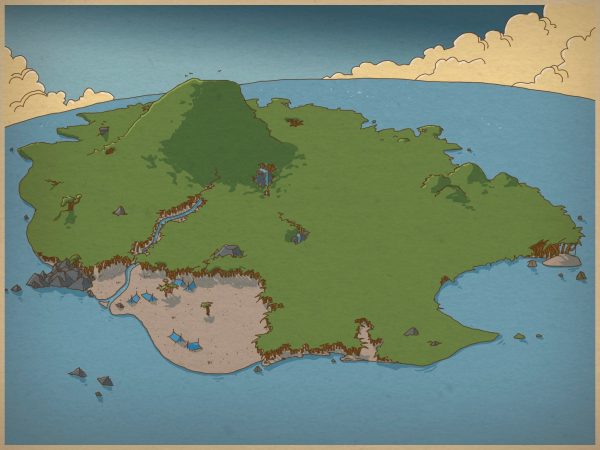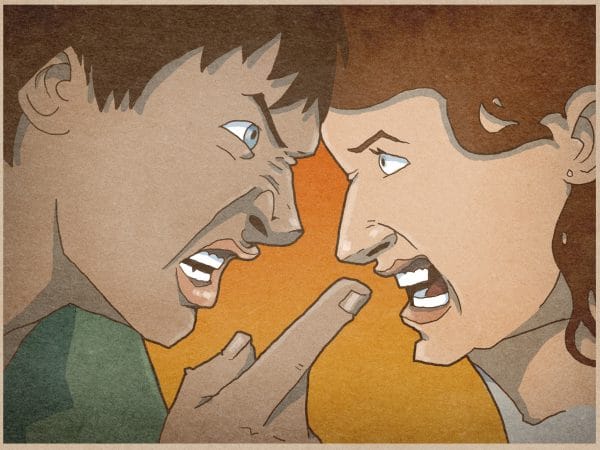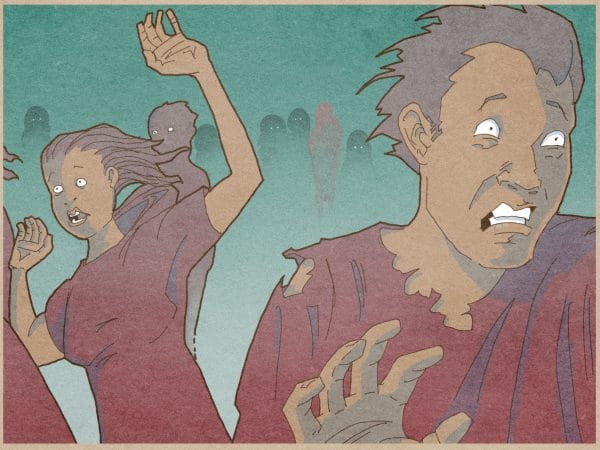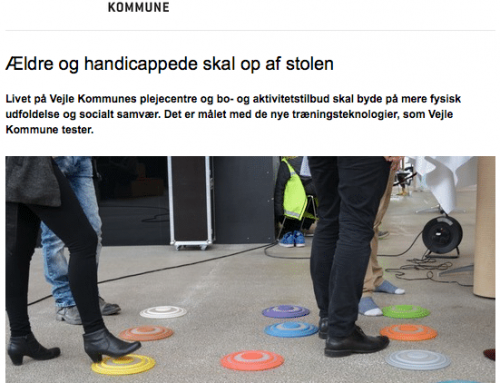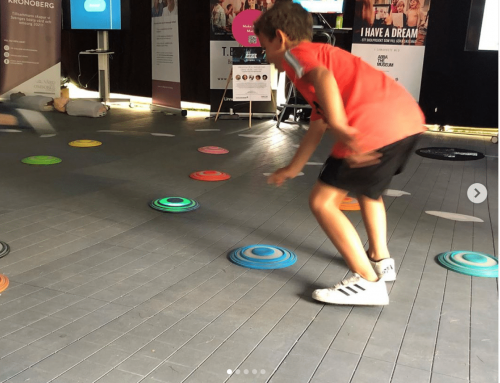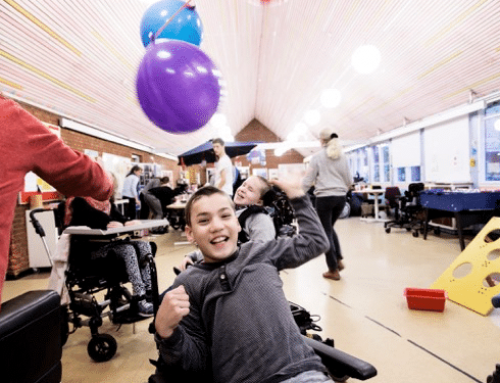6th graders: “The Island scores 8,5 out of 10 as teaching material”
Imagine that you are stranded on a deserted island with your classmates! What would you do first? How would you get food, make decisions and create a community on the island?
Those are the kinds of questions that a 6th grade at Samsøegade Skole in Aarhus, Denmark, had to solve together during a month of playing the interactive game, The Island, for Hopspots in class. The pupils said the following about the experience…
”We have gotten much better at listening to each other and discussing things”
”I think I have gotten better at expressing myself in writing”
“I think it is great that we get to move during our teaching”.
… when we visited them to hear about what they learned from the game.
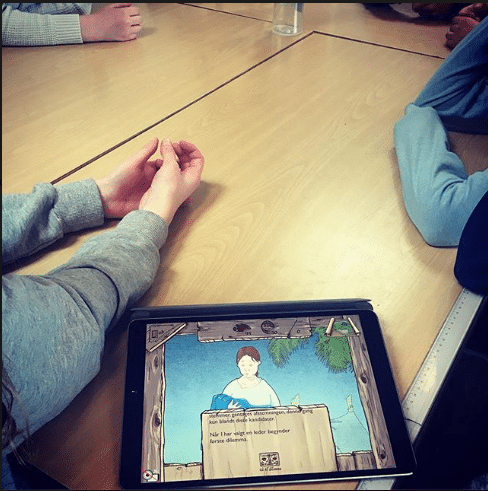
Were they playing in class?
It may come as a surprise, but the game is specifically designed for teaching. The gamification element together with Hopspots, which makes children physically active during classes, is a brilliant way of motivating the children to participate actively in their teaching. They become much more engaged and want to learn and collaborate with their classmates compared to what they do in their ordinary teaching.
When we asked the class what they thought of the game and they way it worked as teaching material compared to their ordinary teaching, one of the pupils said: ”It was a lot of fun because you got to move more and think of something other than regular teaching”.
Their teacher said: “It’s great that the children feel like they were allowed to be more part of and got to decide more in the teaching, and be more active so that they are the ones talking and not the teacher. That’s how we want it most of the time”.
A social science game for the 5th to 9th graders
The Island is an interactive survival game by Danish author, Boris Hansen, which is designed for Hopspots with support from the Danish Ministry of Education. The game combines an introduction to classic social science issues such as democracy, equality, crime control etc., with active play, storytelling, and lots of collaboration between the pupils. The pupils have to read the story on the iPad, solve the dilemmas together and send a group out to the Hopspots-spots in order to collect points for surviving on the island.
The game is designed for the intermediate stage and lower secondary education, specifically for English and social science classes as well as interdisciplinary courses, where it can be used over the course of several weeks or just be played briefly as an active break during the day. The Island is a story in three chapters with each 12 scenarios that the pupils have to solve in order to survive, and that will really challenge their communication-, argumentation- and collaboration skills.
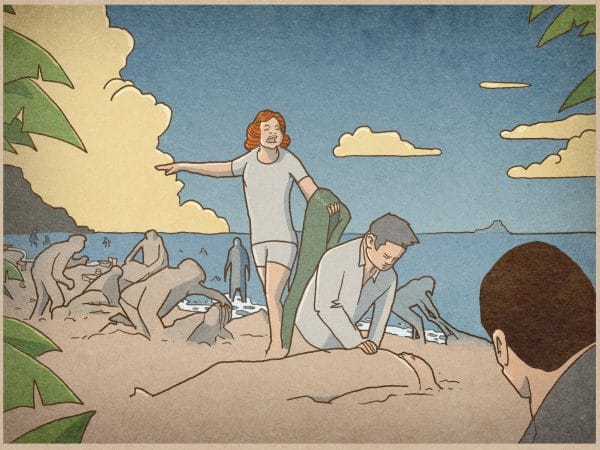
All the beautiful illustrations in the game are made by Mikkel Maltesen.
6th grade’s teacher, Helle, said: ”I think the game works really well as classroom teaching” and she was more than ready to do it again with another class. When we asked the children whether or not they would recommend it to others, we got a nice and clear “YES!” and they gave the game 8,5 on a scale of 1-10, when we asked them how much they liked it.
This is how the 6th grade did it
The game, The Island, is a classic Robinsonade-story consisting of 6 different stages: shipwreck, establishing everyday life on the island, dangerous experiences, preparing a way of getting home and finally the rescue. If the children make it through all the three chapters of the game, they will be taking through all 6 stages and at the same time practice: sentence structure, dialogue, argumentation, collaboration and get an understanding of how democracy works.
This 6th grade at Samsøgade Skole was divided into two large groups, which each their iPad to play their The Island-game on. In that way the two teams were competing to see who could survive the longest. The class had a third iPad located with the Hopspots, which was placed just outside of their classroom.
Team 1 and team 2 used each of their iPad for reading the story and solving the dilemmas. Now and then both teams would send groups of four to Hopspots, where they would collect food- or mood points or explore the island by doing physical collaboration exercises on the spots. These expeditions present, via the speaker in the Hopspots-unit, the children with the sounds from the island, and they have to use this sound in solving the exercises. Thus, it is a good idea to place Hopspots just outside the classroom or in another room than the one where the rest of the two teams are reading and solving the dilemmas in the story.
Assignments to supplement the game with
Besides from the exercises that the game itself contains such as reading, discussion, physical exercises and collaboration, the game can easily be supplemented by some “paper assignments”. We suggest that the pupils:
- Make their own messages in a bottle where they think of what they would write to get help or what they want to be their last words to the world.
- Make a list of the 10 most important things that they would bring with them from the beach where they stranded.
- Write a diary about their lives on the island, the community and all their new experiences.
- Write about what happens when they discover that they are not alone on the island – using the Hollywood model.
- Write about the rescue that finally happens after quite some time on the island.
Your are of course more than welcome to come up with your own assignments that you think fit the game – and if you come up with some great ones we would love to hear about them on: info@hopspots.dk
This 6th grade also worked with the supplementary paper assignments, and particularly the one about the rescue caught their interest.
When we visited them to hear about their experiences with the game, they all presented their stories to us. It was clear that they had really been inspired by the imagery and the phrasing in The Island when they wrote their own stories, which vividly showed us what life on the island had been like and how great it felt to be rescued.


